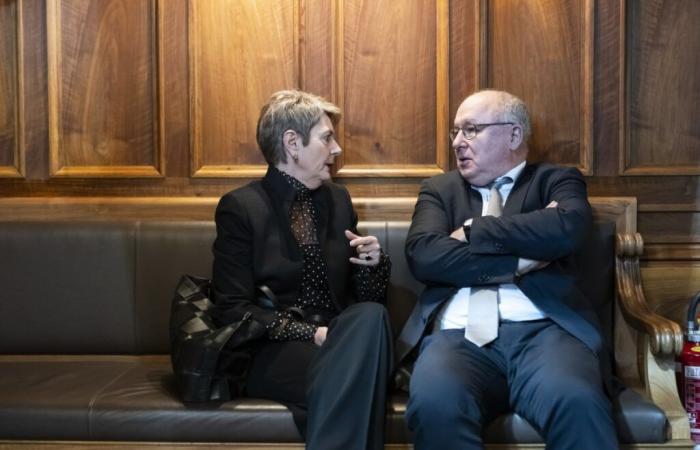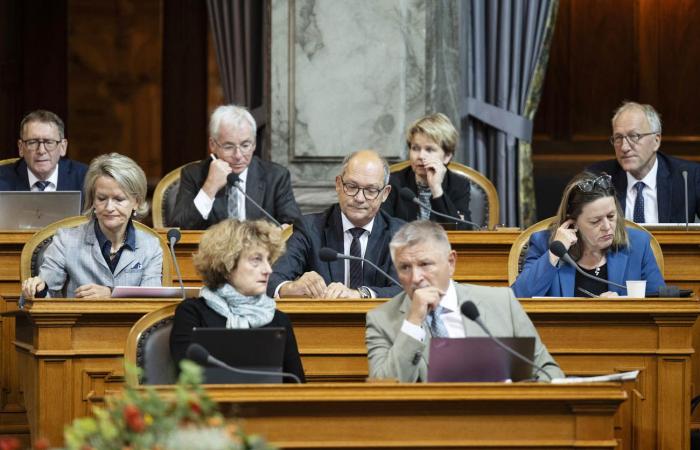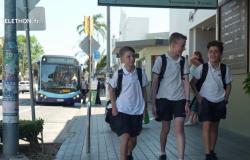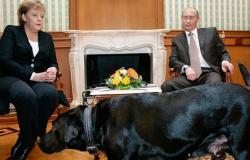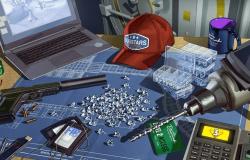Save, but where? Finance Minister Karin Keller-Sutter in discussion with Vaud Socialist State Councilor Pierre-Yves Maillard.
Keystone / Alessandro Della Valle
Fierce debates on the distribution of finances, the migration aspect and the role of Switzerland in the world are scheduled for the winter session of the Federal Chambers which begins next Monday. Overview.
This content was published on
November 29, 2024 – 10.30am
The winter session of Parliament will take place from December 2 to 19 in Bern. Many themes are on the program, some of which directly concern the Swiss abroad.
Concerning the Fifth Switzerland
Electronic identity (e-ID): The Federal Council wants to introduce it in 2026. The National Council has already spoken out this spring in its favor. Then that of the States adopted a law relating to it in September.
But differences remain to be resolved on data protection and security. These could be ironed out during this session. For the director of the Organization of the Swiss Abroad (OSE), Ariane Rustichelli, “this identity will make life easier for the Fifth Switzerland” by giving it better access to the services of the Confederation but also to Swiss banks.
Family reunification: The debate on the elimination of discrimination against Swiss citizens in matters of family reunification will also not be without interest for the Swiss abroad. The National Council has already adopted the bill. But that of the States, the Upper House, rejected it. The National must decide again. It is the effects of the text on immigration which led to its rejection in the States.
Migration, drawer theme
UN Compact on Migration: The question of whether Switzerland should join or not will be submitted to the Lower (National) House. The Council of States has already said no this fall, seeing more risks than benefits. At National, the majority of the commission responsible for this file does not see any added value in signing either. If the no vote prevails, the Federal Council will have to send a letter to the Secretary General of the UN to concede Switzerland’s refusal. The head of Swiss diplomacy, Ignazio Cassis, says he already fears that the country’s image will be damaged internationally.
Switzerland entry tax: The leader of the UDC (conservative right) faction in Parliament, Zougois Thomas Aeschi, wants the Confederation to collect 25 francs from foreigners and adults who enter Switzerland. According to his initiative, the proceeds of this tax must be paid to the old age and survivors insurance fund (AVS), which ensures the retirement of the Swiss. This measure could discourage mass tourism, he argued in his text. Thomas Aeschi takes the example of Bhutan which collects a tax of 200 dollars per day. “With 25 francs, this would be financially bearable for tourists,” he says.
Migration agreement with Morocco: A partnership with Morocco is on the table of the National Council. Asylum requests from people from Maghreb countries (Morocco, Algeria, Tunisia, plus Libya) have increased in recent years. But less than 1% of these requests found favor in Switzerland. Readmission agreements already exist with Algeria and Tunisia, but none exist for Morocco. For Liberal-Radical States Advisor (PLR, bourgeois right) of Lucerne Damian Müller, such an agreement “is necessary, because crimes committed in Switzerland by people from these countries have increased significantly”.
End of protection status S: An initiative from the canton of St. Gallen could be explosive. She calls for the protection status S to be abolished for people from Ukraine who have taken refuge in Switzerland. “Suspicion is growing about the exploitation of this status by a growing number of Roma,” points out this canton in eastern Switzerland. The Confederation must position itself.
Other proposals on asylum policy will also be discussed during this session, in particular to States. A text from the Center Party asks Switzerland to analyze the experiments that have been tried across Europe for more restrictive migration. And to learn lessons from it.
Switzerland in the world
Development assistance: The international cooperation strategy for the period 2025-2028 will be the subject of a shuttle between the two Chambers. In the opinion of the Finance Commission of the National Council, the army must be better equipped to the detriment of development aid. Around 250 million francs should be deducted from the funds intended for this. A cut of 2 billion was even brandished this summer at the Council of States. The two Chambers will begin discussions on compensatory envelopes. Switzerland today invests 0.42% of its gross domestic product (GDP) for development cooperation while the global reference value is 0.7%.
Aid to Ukraine: Three separate motions tabled by MPs from the Green Liberal, Socialist and Center parties demand that Switzerland, in view of its economic prosperity, do more for Ukraine, its contribution being considered relatively modest. More humanitarian aid is requested, comparable to other situations. This could be included among the extraordinary expenses. Submitted to the States, a motion also wants Berne to do more by paying more money for humanitarian aid and deploying more diplomatic efforts.
Hamas, Hezbollah, UNRWA: Last September, the Federal Council adopted a law, then transmitted to Parliament, which aims to ban Hamas, considered a terrorist organization. The National must decide on this in the second week of the session. The security policy committees of both Houses are unanimous in affirming that the Lebanese movement Hezbollah must also be banned. The National will be presented with a first proposal. While the cessation of the Swiss contribution to the UN agency for aid to Palestinian refugees (UNRWA), suspended by the National, must be debated in the Council of States, its committee recently decided to postpone this file .
International agreements: The Council of States must judge the free trade agreement that Switzerland negotiated with India, but there is little opposition. It must also approve the readjustment of double taxation conventions with Serbia, Angola, Jordan and Germany.
The National Council will for its part encourage the government to extend its strategy with China, the Minister of Foreign Affairs Ignazio Cassis having let it expire. Switzerland is currently renegotiating the free trade agreement concluded in 2013 with the Middle Kingdom. But this document remains controversial. Critical voices fear, for example, that China will first use this document as a stepping stone to fuel its ambitions.
Political signals: A postulate submitted to the National Council calls for recognition of the existence of a genocide, as well as mass murders and rapes committed by the Islamic State on the Yazidi people in 2014 in Iraq. This approach only aims for recognition by the National Council, and not by Switzerland, which is easier to obtain while maintaining a symbolic political impact.
Another file: the conflict in Nagorno-Karabakh. The Foreign Policy Commission of the National Council urges the Federal Council to organize an International Peace Forum as quickly as possible. A motion will be put to a vote.
Battle over the 2025 budget
Debt brake: This session will also make it possible to finalize the Confederation’s budget for 2025. Cuts are announced. The debates are likely to be fierce. Switzerland must comply with its debt brake as finances become scarce. The army is asking for more resources and the 13th AVS pension, voted for recently, is not yet covered.
Where could the necessary money come from? The army should have around half a billion francs more in 2025 than initially planned. The relevant committees of both Houses agree. The question is where to cut to find the money? The debate is lively.
More money for which army? While reforms are certainly underway within the army, the plans need to be refined. A connoisseur of defense issues at the Federal Palace, Uri’s PLR state advisor Josef Dittli asked the government to establish “a basic document” on the objectives as well as the strategic direction of the army. Latent questions immediately came back to the fore. Opponents of an increase in the envelope deplore the absence of a clear concept and priorities. This theme will give rise to serious skirmishes in Bern.
Swiss politics in brief: the essentials for making informed democratic decisions gathered in just one newsletter.
And Europe in all this?
It is during the last week of the session that the Federal Council should be able to deliver the results of its negotiations with the European Union. This can potentially relegate other objects to second place, with each party and parliamentarian then wanting to position themselves.
Text reread and verified by Samuel Jaberg, translated from German by Alain Meyer/dbu
Learn more
Following
Previous
Plus
An autumn session marked by nervousness
This content was published on
27 sept. 2024
What did the autumn session of the Swiss Parliament bring? Lots of disagreements, but little progress, especially if we look at it from the point of view of the Swiss abroad.
read more An autumn session marked by nervousness

